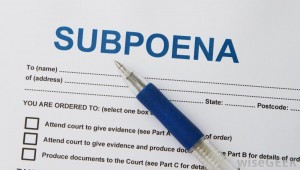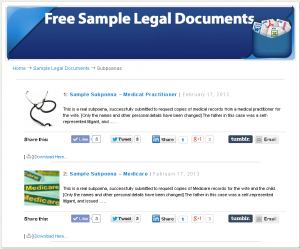 In family law disputes, it might be necessary to subpoena medical records of either the opposing party or a third party.
In family law disputes, it might be necessary to subpoena medical records of either the opposing party or a third party.
Seeking to issue a subpoena can be a complicated process, and is regulated by court rules of the relevant courts.
This ‘how to’ guide seeks to provide a step-by step guide to assist a self-represented litigant who want a court to issue a subpoena for medical records.
What is a subpoena?
A subpoena is a legal document issued by the court at the request of a party. A subpoena compels a person to produce documents or give evidence at a hearing or trial. There are 3 kinds of subpoena:
- Subpoena for production;
- Subpoena to give evidence; and
- Subpoena for production and to give evidence
This guide will deal mostly with the subpoena for production (1), though, it might be necessary to subpoena a medical expert to give evidence at a hearing.
What constitutes medical record?
Medical record means the histories, reports, diagnoses, prognoses, interpretations and other data or records, written or electronic, relating to the person’s medical condition, that are maintained by a physician, hospital or other provider of services or facilities for medical treatment1
Before you apply
It is important to note that the Family Court of Australia will not issue a subpoena for a self-represented litigant unless a registrar has given prior approval.2 In such a case, it is necessary to prepare a letter to support the subpoena.
How to apply
Step 1: Fill out the form You will need to complete the form titled Subpoena which is obtainable from Court registries or downloadable from the court websites:
Note: Make sure that the form that you are filling out has been approved by the court in which you are litigating.
When completing the subpoena form, keep in mind:
■ – A subpoena must identify the person to whom it is directed by name or by description or office or position. If you wish to subpoena an organisation, the subpoena should be directed to a person authorised to act on behalf of the organisation.
■ – A subpoena for production must identify the specific documents to be produced. For example: “Any records, notes or reports or any other written material held by any facility of X Area Health Service, including but not limited to Hospital X relating to person X and relating to an alleged sexual assault on 1/01/2014.”
■ – You cannot request the issue of a subpoena requiring the production of a document in the possession of the Court or any other Court. To seek a document in the possession of a Court you have to give written notice to the Court.
Step 2: File the Subpoena Once you have completed the subpoena, file it at the Court. You will need to file the original and at least two copies. You will need to ensure that you have enough copies for service on each other party including the independent children’s lawyer if one has been appointed. The Court will keep the original subpoena and give you back the copies sealed with the Court’s stamp.
Step 3: Serve the subpoena
3.1 Mode of service There are differing requirements for service in different jurisdictions.
- – Family Court of Australia: The Court requires that a person who requested the subpoena to be issued must arrange for it to be personally handed to the named person.
- – Federal Circuit Court of Australia: This court does not require subpoenas for production only to be personally handed to the named person. Subpoenas for production only may be served on the person to be subpoenaed by ordinary service. Subpoenas to give evidence or subpoenas to give evidence and produce documents must be personally handed3
- – Family Court of Western Australia: This court requires all subpoenas to be personally handed to the defendant.
3.2 Time of Service
- – In the Family Court, the issue of a subpoena for production must be served 7 days before the court date.4
- – In the Federal Circuit Court, a subpoena requiring production must be served at least 10 days before production under the subpoena is required.5
3.3 Brochure When serving the subpoena on the person subpoenaed, and other parties or interested person, you should also provide them with a copy of a brochure which gives the named person information about their rights and obligations. These brochures can be obtained from the relevant Court registries or downloadable from court websites.
3.4 Notice
3.5 Conduct Money At the time of service of a subpoena, conduct money should be provided to the named person. If you do not provide this money, the named person is not required to comply with the subpoena. For a subpoena for production, you must give the named person conduct money sufficient to meet the reasonable expense of complying with the subpoena. This includes the cost of identifying the documents, copying and collating the documents required. Minimum conduct money for the production of documents will be at least $10 or other sum ordered by the court or agreed to by the parties.
Special Rules for subpoenas for production of documents
In some cases, all parties may be automatically permitted inspect documents produced under a subpoena without the need to attend a court date. 6 This can only occur if:
- – The subpoena is issued more than 21 days before the court date.
- – The named person and all other parties including the independent children’s lawyer are served with;
- – The subpoena;
- – A written notice that the person requesting the subpoena intends to rely on this provision at least 21 days before the court date.
- – You file an affidavit of such service at least seven days before the court date.
- – The named person produces the medical records more than seven days before the court date and does not object to any party inspecting the documents.
- – No other party to any party inspecting or copying the documents by ten days prior to the court date.
Note– in the Federal Circuit Court an inspecting party will not be able to photocopy medical records. 7
Objection to produce documents
A person may object to the production of the documents required by the subpoena for various reasons including:
- The documents are irrelevant;
- The documents are privileged;
- The terms of the subpoena are too broad.
Such a person may seek an order for a subpoena to be set aside.
Inspection of Medical Records
In the Federal Circuit Court, the person whose records have been produced may give notice to the Court that they want to inspect those medical records in order to decide if they wish to object to their inspection. 8
If they object to their records being inspected, they are allowed to file their notice of objection within 7 days after the date for production in the subpoena. In this case, you, or any other party or interested person, will not be permitted to inspect the medical records until the later of 7 days after the date for production, or the hearing and determination of any objection.
- Federal Circuit Court Rules 2001 (Commonwealth) s 15A.
- Family Law Rules 2004 (Commonwealth) Reg 15.18.
- See Division 6.3 of the Federal Circuit Court Rules 2001(Commonwealth) for more information on ordinary service.
- Family Law Rules2004 (Commonwealth) 15.28(1).
- Federal Circuit Court Rules(2(Commonwealth) Reg.15A.04(3).
- See Division 15.30 of the Family Law Rules2004 (Commonwealth).
- Federal Circuit Court Rules 2001 (Commonwealth) Reg 15A.13(2)(b).
- Federal Circuit Court Rules 2001Reg 15A.14.
Prajesh Shrestha
Latest posts by Prajesh Shrestha (see all)
- How to File a Subpoena For Medical Records - October 14, 2015
- How to Remove a Judge or/and an ICL from Proceedings - September 3, 2015
- Implications to Pre-Nuptial Agreements – the Pole Dancer Case: Wallace v Stelzer - December 11, 2014





